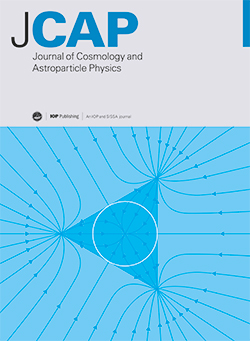弱透镜中重子反馈对宇宙学依赖性的影响
IF 5.9
2区 物理与天体物理
Q1 ASTRONOMY & ASTROPHYSICS
Journal of Cosmology and Astroparticle Physics
Pub Date : 2025-03-20
DOI:10.1088/1475-7516/2025/03/041
引用次数: 0
摘要
非线性尺度的稳健建模对于第四阶段调查中精确的宇宙学推断至关重要。特别是对于弱透镜分析,一个关键的挑战来自于对非引力过程(如超新星和活动星系核)如何影响物质分布的不完全理解,这些过程统称为重子反馈。现有的几种模拟重子反馈的方法将其独立于潜在的宇宙学,这一假设已被流体动力学模拟发现是不准确的。在这项工作中,我们研究了重子反馈和宇宙学之间的这种耦合对LSST Y1精度参数推断的影响。我们使用Magneticum流体动力学模拟套件构建模拟3×2pt数据向量,该套件涵盖了广泛的宇宙学,同时保持子网格参数固定。我们对两种重子缓解技术进行了模拟似然分析:(i)主成分分析(PCA)方法,该方法确定了捕获重子反馈对数据向量的影响的特征模式;(ii) HMCode2020[1],该方法使用晕轮模型方法对物质分布的变化进行了分析建模。我们的研究结果表明,PCA方法比HMCode2020更具鲁棒性,对于与基线宇宙学的较大偏差,其偏差Ωm-S8分别高达0.3σ和0.6σ。对于HMCode2020,偏差与输入宇宙学相关,而对于PCA,我们没有发现这种相关性。本文章由计算机程序翻译,如有差异,请以英文原文为准。
Impact of cosmology dependence of baryonic feedback in weak lensing
Robust modeling of non-linear scales is critical for accurate cosmological inference in Stage IV surveys. For weak lensing analyses in particular, a key challenge arises from the incomplete understanding of how non-gravitational processes, such as supernovae and active galactic nuclei — collectively known as baryonic feedback — affect the matter distribution. Several existing methods for modeling baryonic feedback treat it independently from the underlying cosmology, an assumption which has been found to be inaccurate by hydrodynamical simulations. In this work, we examine the impact of this coupling between baryonic feedback and cosmology on parameter inference at LSST Y1 precision. We build mock 3×2pt data vectors using the Magneticum suite of hydrodynamical simulations, which span a wide range of cosmologies while keeping subgrid parameters fixed. We perform simulated likelihood analyses for two baryon mitigation techniques: (i) the Principal Component Analysis (PCA) method which identifies eigenmodes for capturing the effect baryonic feedback on the data vector and (ii) HMCode2020 [1] which analytically models the modification in the matter distribution using a halo model approach. Our results show that the PCA method is more robust than HMCode2020 with biases in Ωm-S8 up to 0.3σ and 0.6σ, respectively, for large deviations from the baseline cosmology. For HMCode2020, the bias correlates with the input cosmology while for PCA we find no such correlation.
求助全文
通过发布文献求助,成功后即可免费获取论文全文。
去求助
来源期刊

Journal of Cosmology and Astroparticle Physics
地学天文-天文与天体物理
CiteScore
10.20
自引率
23.40%
发文量
632
审稿时长
1 months
期刊介绍:
Journal of Cosmology and Astroparticle Physics (JCAP) encompasses theoretical, observational and experimental areas as well as computation and simulation. The journal covers the latest developments in the theory of all fundamental interactions and their cosmological implications (e.g. M-theory and cosmology, brane cosmology). JCAP''s coverage also includes topics such as formation, dynamics and clustering of galaxies, pre-galactic star formation, x-ray astronomy, radio astronomy, gravitational lensing, active galactic nuclei, intergalactic and interstellar matter.
 求助内容:
求助内容: 应助结果提醒方式:
应助结果提醒方式:


